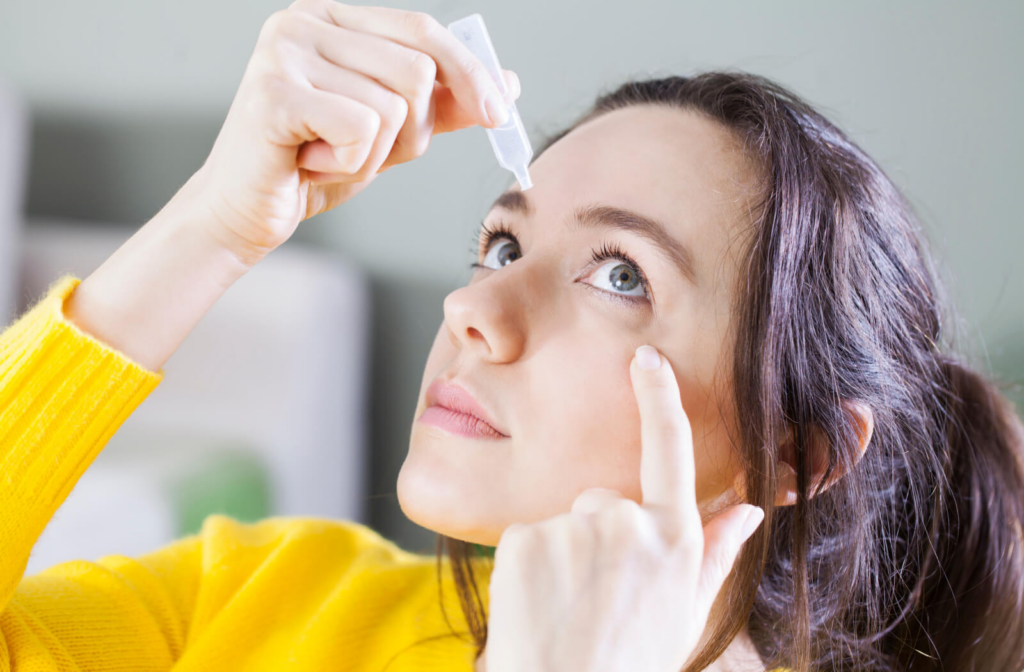The right eye drops can help relieve uncomfortable eye symptoms like scratchiness, irritation, and redness, but eye drops don’t last forever.
Typically, unopened eye drops can last 1 to 2 years, and opened eye drops should be disposed of after 30 days.
Some preservative-free drops can last less time, but always follow the directions on the package.
The doctors at Pack & Bianes Optometry Terra Nova can recommend brands or types of drops depending on your symptoms and overall eye health.
Different Types of Eye Drops
Walking down the drugstore eye care aisle, there are seemingly endless types of eye drops. You can narrow down the overwhelming options by talking to your optometrist and selecting the right drops for your eye concerns.
Artificial Tears
Lubricating eye drops, or artificial tears, are designed for those suffering from dry eyes. These drops aim to restore moisture to the eyes and imitate the elements of your natural tears, rejuvenating the tear film to help protect the eye’s surface.
You can develop dry eyes from:
- Digital eye strain from computer use
- Certain medical conditions
- Smoky or windy air
- Natural aging
- Hormonal changes
- Contact lens wear
Artificial tears come in two categories:
- Lubricating eye drops with preservatives: these come in standard, multidose bottles and contain preservatives to extend their shelf life and prevent bacterial growth from contaminating the drops. If you’re using these drops more than 4 times a day, they may irritate your eyes, making drops without preservatives a better choice.
- Preservative-free lubricating eye drops: these drops come in single-use vials and are gentler on the eyes for those who use eye drops frequently. Since they don’t have preservatives, you should only open a vial when you’re using it immediately or within a few hours.
Allergy Relief Eye Drops
Depending on your allergy type, your eye doctor may recommend using artificial tears, cold compresses, and avoiding allergy triggers. Some of the most common allergy symptoms include:
- Burning sensations
- Itchy eyes
- Bloodshot eyes
- Eyelid swelling
- Tearing
- Feeling like there’s something in the eye
Dust, pollen, and pet dander are only some widespread causes of allergies. Most allergy eye drops include medical ingredients to provide relief, including:
- Antihistamines
- Anti-inflammatories
- Decongestants
- Multiple action
Optometrists may recommend prescription eye drops for those who cannot relieve intense allergy symptoms with over-the-counter selections.
Eye Drops for Red Eyes
Red eyes are a common symptom of allergies, so many assume that red eye drops can manage allergic reactions. But red eyes can also be a result of:
- Dry eyes
- Tired eyes
- Smoke exposure
- Contact lens irritation
- Conjunctivitis, or pink eye
When the blood vessels become irritated, they can expand, making them highly visible. Redness-relieving eye drops use a decongestant to limit the swelling of the blood vessels. However, when the decongestant wears off, eye redness can return even worse.
Redness-relieving eye drops can effectively reduce red eyes, but most optometrists recommend using artificial tears rather than eye drops for red eyes.
How to Use Eye Drops
Eye drops are easy, but maintaining good hygiene is critical to keeping your eyes healthy. Whether you’re using eye drops yourself or have someone doing it for you, there are some general guidelines you can follow:
- Wash your hands thoroughly before opening the bottle and touching your eyes
- Tilt your head back and gently pull the lower lid down with one of your fingers
- With the other hand, hold the bottle above your eye and squeeze the drops
- Don’t touch the tip of the bottle to your skin or eyelid to avoid contamination
- Keep your eyes closed and don’t rub your eyes or blink away the drops
- Put light pressure on your tear duct to stop the drops from draining
Can You Use Expired Eye Drops?
Disposing of a bottle of eye drops that isn’t empty may seem like a waste, but expired eye drops should always be discarded after 30 days of opening. Using unopened bottles of eye drops beyond their expiration date is also a bad idea. Eye drops are medical products, so you have 2 primary consequences of using outdated drops:
- Ingredients become inactive: the drops can become less potent, and the active ingredients may have broken down over time, and instead of treating your eye concerns, they may make it worse
- Contamination in the bottle: eye drops with preservatives can only guarantee safety within the bounds of their expiration date, and bacteria can begin to grow, causing inflammation, irritation, or infection

Talk to Your Optometrist About Eye Drops
In a world full of allergens, digital screens, wind, smoke, and other eye irritants, eye drops can offer relief safely and efficiently. Before you put any eye care product in your eyes, visit Pack & Bianes Optometry Terra Nova for a comprehensive eye exam to discuss your symptoms.
We can offer eye drop recommendations to keep your eyes and contact lenses comfortable and nourished. Contact us today!



